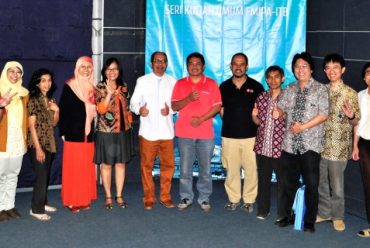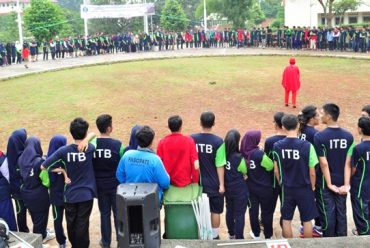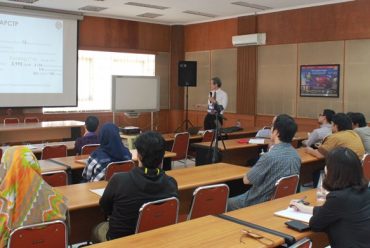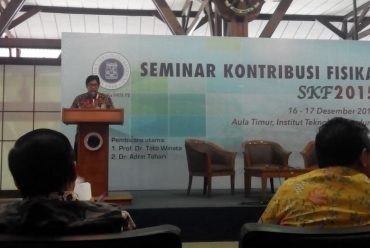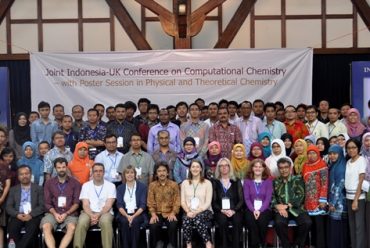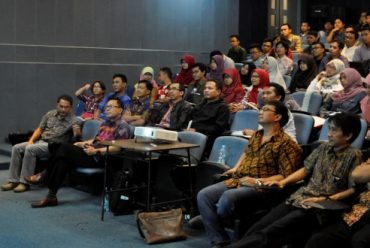Kuliah Kimia Masyarakat Seri 2: ????? ????? ????????? ?? ? ?????? ?? ?????? ??????? ??????: ???????? ? ????????? ?? ????????? ?????? ?????
- Posted: April 3, 2024
- By: Firmansah Heru Bawono
- Category: Berita
BANDUNG, fmipa.itb.ac.id –Pada pertemuan kuliah kimia dan masyarakat seri 2 ini, tamu atau pembicara yang hadir adalah Eunike Mahayoni. Beliau adalah alumni kimia ITB angkatan 2012 dan lulus sebagai sebagai sarjana pada 2016. Selama perkuliahan di ITB beliau mengambil tugas akhir di kelompok keilmuan kimia organik dengan topik kimia bahan alam di bawah bimbingan (alm) Prof. Yana Maolana Syah. Beliau kemudian menempuh pendidikan Magisternya di Korea, KIST University of Science and Technology pada bidang nanotechnology dari 2017 hingga 2020. Kemudian beliau kembali melanjutkan pendidikan Doktornya di Université de Picardie Jules Verne, Prancis dengan bidang material chemistry dari 2020 hingga 2023. Saat ini beliau sedang menempuh penelitian postdoc dengan topik penelitian solid-state batteries.
Pada saat beliau menempuh studi Magister di Korea, beliau terlibat pada projek pengembangan material untuk mendegradasi sulfur mustard, yaitu suatu senjata kimia yang masih digunakan oleh korea utara. Saat ini beliau sedang terlibat dalam pengembangan teknologi solid-state batteries. Beliau menjelaskan mengenai perjalanan dari teknologi tersebut hingga aplikasi dan project yang saat ini beliau kembangkan.
Di akhir sesi, beliau memberi tips dan saran mengenai membangun CV akademik. Menjadi seorang ilmuan atau scientist diperlukan keinginan, disiplin, dan rasa ingin tahu yang tinggi. Selain itu saat memilih untuk menempuh pendidikan di luar negeri, perlu dilakukan pemetaan mengenai ketertarikan diri, skill, faktor geografi dari tempat yang ingin dituju. Sebelumnya dijelaskan juga mengenai pertimbangan kondisi sosial dimana lokasi studi diambil.
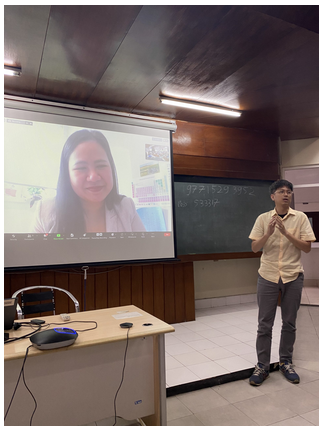 Pada sesi pertanyaan terdapat pertanyaan mengenai kenapa mengambil bidang yang berbeda pada saat menempuh pendidikan Magister dan Doktor. Beliau bercerita bahwa beliau senang pada saat belajar kimia organik. Tetapi pada saat menempuh tahap sidang, beliau menemukan minat yang tinggi pada saat menjawab pertanyaan yang berkaitan tentang kimia anorganik. Sehingga studi yang beliau ambil untuk Magister dan Doktor adalah bidang kimia anorganik. Hasil sharing beliau terdapat dua bahan pembelajaran yaitu terus menerus menggali potensi diri dan semangat untuk menuntut ilmu. Dari cerita yang disampaikan, saya rasa banyak sekali pengalaman yang sudah dijalani oleh pembicara untuk sampai pada titik tersebut. Selain itu, kecakapan dalam berbicara dengan berbagai bahasa juga menjadi modal penting dalam menempuh karir di dunia akademik di luar negeri. Kemampuan dalam networking dan mencari kesempatan dalam menempuh pendidikan dan karir di luar negeri juga penting dalam membina relasi dan tim. Di akhir sesi beliau bercerita mengenai funding dalam menempuh pendidikan dan melakukan riset. Hal ini sangat bermanfaat untuk mahasiswa kimia yang ingin meneruskan Pendidikan di luar negeri (Irgi Henesta).
Pada sesi pertanyaan terdapat pertanyaan mengenai kenapa mengambil bidang yang berbeda pada saat menempuh pendidikan Magister dan Doktor. Beliau bercerita bahwa beliau senang pada saat belajar kimia organik. Tetapi pada saat menempuh tahap sidang, beliau menemukan minat yang tinggi pada saat menjawab pertanyaan yang berkaitan tentang kimia anorganik. Sehingga studi yang beliau ambil untuk Magister dan Doktor adalah bidang kimia anorganik. Hasil sharing beliau terdapat dua bahan pembelajaran yaitu terus menerus menggali potensi diri dan semangat untuk menuntut ilmu. Dari cerita yang disampaikan, saya rasa banyak sekali pengalaman yang sudah dijalani oleh pembicara untuk sampai pada titik tersebut. Selain itu, kecakapan dalam berbicara dengan berbagai bahasa juga menjadi modal penting dalam menempuh karir di dunia akademik di luar negeri. Kemampuan dalam networking dan mencari kesempatan dalam menempuh pendidikan dan karir di luar negeri juga penting dalam membina relasi dan tim. Di akhir sesi beliau bercerita mengenai funding dalam menempuh pendidikan dan melakukan riset. Hal ini sangat bermanfaat untuk mahasiswa kimia yang ingin meneruskan Pendidikan di luar negeri (Irgi Henesta).


